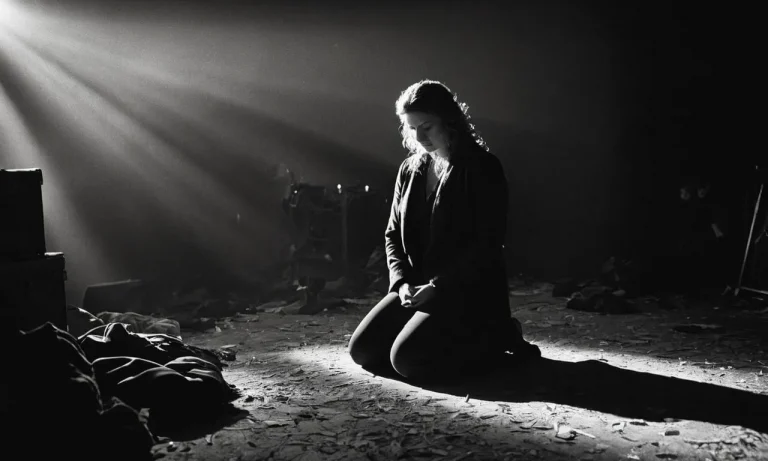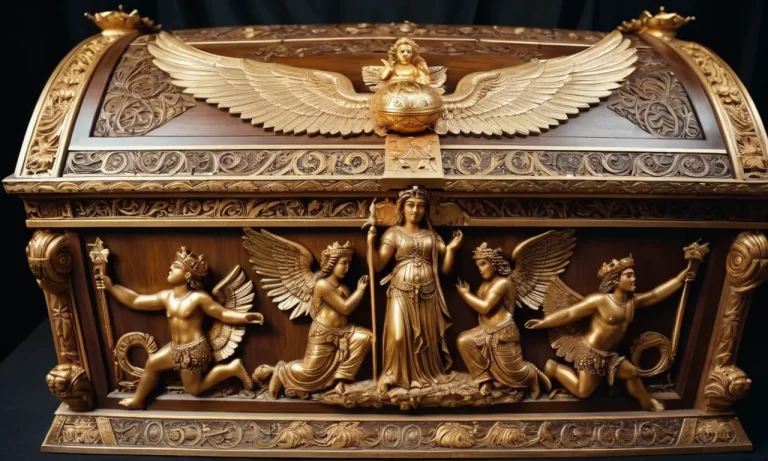The Covenant Between God And Moses: A Complete Overview
The covenant between God and Moses is a pivotal moment in biblical history. It established Moses as the leader of the Israelites and set forth the laws and commandments that the Israelites were to follow. This covenant shaped the Israelite nation and still influences followers of God today.
If you’re short on time, here’s a quick answer to what the covenant between God and Moses entailed: God chose Moses to lead the Israelites out of slavery in Egypt and into the Promised Land. In return, the Israelites agreed to worship God alone and follow the Ten Commandments and other laws God gave them through Moses.
God Calls Moses to Lead the Israelites Out of Egypt
Moses’s Early Life and Calling
Moses was born to Israelite parents during a time when the Pharaoh had ordered the death of all newborn Israelite boys. To save him, Moses’s mother put him in a basket and placed it in the Nile river, where he was found and adopted by an Egyptian princess.
Though raised in Pharaoh’s household, Moses identified with his Israelite heritage.
One day, Moses saw an Egyptian beating a Hebrew slave and killed the Egyptian in defense of the Israelite. Fearing punishment, Moses fled Egypt to the land of Midian, where he married Zipporah and became a shepherd.
After 40 years in Midian, Moses encountered God through a burning bush, an amazing meeting that changed his life and set the stage for God to use him to deliver the Israelites from Egyptian bondage.
The Burning Bush: God Assigns Moses His Mission
While tending his father-in-law Jethro’s sheep near Horeb, the mountain of God, Moses noticed a bush that was burning but not being consumed by the flames. When Moses approached, God called to him from the bush, revealing His name as “I AM WHO I AM.”
God then told Moses He had heard the cries of the Israelites in their slavery and had come down to deliver them from Egypt, assigning Moses the task of confronting Pharaoh and leading the Israelites out of bondage.
Despite initial doubts and reluctance, Moses embraced his calling after a series of reassuring words, signs, and miracles from God. Among other things, God equipped Moses with miraculous staffs and the ability to turn his hand leprous and restore it, gave him his brother Aaron as a spokesman, and promised to teach them what to say and do.
God also said He would harden Pharaoh’s heart so that His wonders could be multiplied in the land of Egypt.
Thus commissioned and empowered by God Himself, Moses and Aaron were ready for the confrontations with Pharaoh that would ultimately lead to freedom for the people of Israel.
The Ten Plagues and Exodus From Egypt
Background on the Israelites’ Enslavement in Egypt
The Israelites had been living in Egypt for over 400 years by the time Moses was born, having originally moved there during a famine in Canaan. Over the centuries, the Egyptian pharaohs had forced them into slavery, oppressing them and making them build cities like Pithom and Rameses.
The Israelites cried out to God to deliver them from bondage. God heard their cries and chose Moses to go before Pharaoh to demand the release of the Israelites from Egypt.
The Ten Plagues God Unleashes on Egypt
When Pharaoh refused to let the Israelites leave Egypt, God unleashed ten plagues on the land of Egypt to show His power and might. These plagues were as follows:
- God turned the Nile River and all water in Egypt to blood for seven days, killing all the fish.
- God sent a plague of frogs to cover the land of Egypt.
- God turned the dust of Egypt into gnats or lice which bothered people and animals.
- God sent swarms of flies to annoy the Egyptians.
- God inflicted a pestilence that killed the Egyptians’ livestock like cattle, horses, camels, sheep, and donkeys.
- God caused festering boils to break out on humans and animals throughout Egypt.
- God sent thunder, hail, and fire that ran along the ground, destroying crops, trees, and people.
- God sent swarms of locusts that ate every plant and tree left in Egypt after the hail.
- God brought total darkness over the land of Egypt for three days.
- God killed the firstborn son in every Egyptian family, even the firstborn of Pharaoh.
Through each plague, God demonstrated His supremacy over the Egyptian gods and all the forces of nature that the Egyptians worshipped. Each plague specifically countered an Egyptian deity – the plague of blood defeated the god Khnum, guardian of the Nile; the plague of frogs defeated the goddess Heqt, represented by frogs; the plague of gnats discredited the god Khepri, god of creation and rebirth, often depicted as a scarab beetle or fly, etc.
Despite the devastation of each plague, Pharaoh stubbornly refused to let the Israelites leave Egypt.
The First Passover and the Parting of the Red Sea
After nine plagues, Pharaoh still would not relent. So God instituted the tenth and final plague – the death of the firstborn males in Egypt. To protect themselves, God commanded the Israelites to sacrifice a lamb and smear its blood on their doorposts so that the Lord would pass over their homes when He came to kill the firstborns of Egypt.
This event came to be known as Passover.
That fateful night after the Passover feast, the Lord struck down all the firstborn sons in Egypt, including Pharaoh’s own son. Finally Pharaoh summoned Moses and told the Israelites to leave Egypt. That very night, the Israelites fled Egypt in the Exodus.
When Pharaoh’s army pursued them to the Red Sea, God miraculously parted the waters so the Israelites could walk through on dry land! When the Egyptians tried to follow, the waters collapsed and drowned Pharaoh and his army.
This stunning demonstration of God’s power both delivered the Israelites from slavery and judged the gods of Egypt.
God Makes a Covenant With the Israelites at Mount Sinai
After fleeing from slavery in Egypt, the Israelites arrived at Mount Sinai, where God descended upon the mountain in fire and spoke to Moses. This marked a defining moment in Israelite history as God established his covenant with the people.
The Israelites Arrive at Mount Sinai
The Israelites set up camp at the base of Mount Sinai, a sacred site in the wilderness. This was around 1440 BCE based on biblical chronology. The people prepared themselves to encounter God’s presence by consecrating themselves and washing their clothes.
There was thunder and lightning as God descended upon the mountain in smoke and fire. The Israelites trembled in awe at this powerful divine manifestation.
The Ten Commandments
God proclaimed the fundamental principles of the covenant to the Israelites at Mount Sinai. These principles were embodied in the Ten Commandments, which spelled out the Israelites’ duties toward God and one another.
The first few commandments centered on worshipping only the one true God, observing the Sabbath, and honoring one’s parents. Other commandments focused on moral issues like prohibiting murder, adultery, theft, and dishonesty.
The Ten Commandments established the ethical and spiritual code that was to shape Israelite society. They represented the core stipulations of the covenant that God expected the Israelites to live by. For generations to come, the Ten Commandments provided a concise expression of God’s expectations for his people.
Laws on Social Justice and Worship
In addition to the Ten Commandments, God gave Moses an extensive body of laws at Mount Sinai to govern Israelite society. These laws covered issues like social justice, property rights, violence and injury, marriage and sexuality, worship practices, and community purity. For example:
- Laws protected vulnerable groups like widows, orphans, and foreigners living in Israel
- Judges were to adjudicate legal cases fairly regardless of social status
- Guidelines promoted community health and hygiene
- Regulations defined proper worship practices and unacceptable occult activities
- Cities of refuge were designated to protect someone who accidentally caused another’s death
This expansive legal corpus was given to establish a just, compassionate, and righteous society reflecting God’s character. The laws covered all aspects of Israelite life and arising issues. Obedience demonstrated one’s loyalty to the covenant with God.
Moses Receives the Tables of the Covenant
Moses Ascends Mount Sinai for 40 Days
After the Israelites escaped Egypt and arrived at Mount Sinai, God called Moses to ascend the mountain. There, God revealed the Ten Commandments and other laws to Moses which would form a covenant between Himself and the Israelites (Exodus 24:12).
Moses remained on Mount Sinai for 40 days and 40 nights receiving intricate instructions from God on how to build the Ark of the Covenant and tabernacle (Exodus 24:18).
Golden Calf Incident During Moses’s Absence
During Moses’ prolonged absence, the Israelites feared he would not return and coerced Aaron into constructing a golden calf idol (Exodus 32:1). The people used this idol for idolatrous revelry and sacrifice to other gods which violated the covenant that God just established through Moses.
God grew angry and told Moses He would annihilate the Israelites for this sin upon Moses’ descent.
Moses Descends and Breaks the Tablets
When Moses returned carrying the stone tablets engraved with the Ten Commandments (Exodus 32:15), he witnessed the Israelites’ behavior and shattered the tablets in divine anger. The Levites killed 3,000 people in repentance on Moses’ command.
Later God instructed Moses to carve a second set of tablets which were placed in the Ark of the Covenant after the tabernacle’s completion (Exodus 34:1).
The Israelites Agree to Follow God’s Covenant
God Renews the Covenant With Moses
After the Israelites constructed and worshipped a golden calf while Moses was on Mount Sinai receiving the Ten Commandments from God, the Lord considered abandoning His chosen people for breaking the covenant so quickly. However, Moses interceded and pleaded for mercy on their behalf.
Moved by Moses’ devotion, God agreed to renew the covenant and continue watching over the Israelites (Exodus 34).
According to Scripture, when Moses ascended Sinai again, God passed in front of Him and declared, “The Lord, the Lord, the compassionate and gracious God, slow to anger, abounding in love and faithfulness…” (Exodus 34:6).
This powerful self-revelation of God’s character convinced Moses that the Lord intended to recommit to the Israelites despite their grievous sin.
Details of the Renewed Covenant
The renewed covenant included key commandments and promises. For example, God commanded the people to observe the Sabbath day, avoid idolatry, and offer their firstfruits to the Lord. In response, He promised to drive out their enemies, grant fertility, and bless them abundantly in the Promised Land of Canaan.
There were also more ceremonial precepts like holding three annual feasts and offering sacrifices. Scholars point out that while the stipulations differed slightly from the first covenant, God still emphasized worshipping Him alone, observing holy days, and avoiding assimilation with pagan neighbors – all key to preserving Israel’s special status as God’s treasured possession.
The Israelites Pledge Their Commitment
When Moses returned from Mount Sinai, his face shone brightly from speaking directly with God. After relaying the covenant’s demands and promises, Moses hid his radiant face behind a veil which he removed whenever he spoke with the Lord or made His commands known to the people.
The Israelites, awestruck by Moses’ glory, pledged full obedience to the renewed covenant (Exodus 34; 2 Corinthians 3).
In his writings, the Apostle Paul pointed out that just as Moses veiled the glory fading from his face, in a spiritual sense there was a “veil” over the minds of the Israelites regarding the full meaning of the old covenant.
Paul explained that this veil is removed through faith in Christ’s new covenant, allowing complete spiritual understanding to dawn in a believer’s mind.
Conclusion
The covenant between God and Moses was a defining moment for the Israelite people. It bound them in a special relationship with God where He promised to be their God and make them His treasured people, as long as they followed His laws.
This covenant made at Mount Sinai shaped every aspect of Israelite society and still influences Judeo-Christian thought and practice today.








